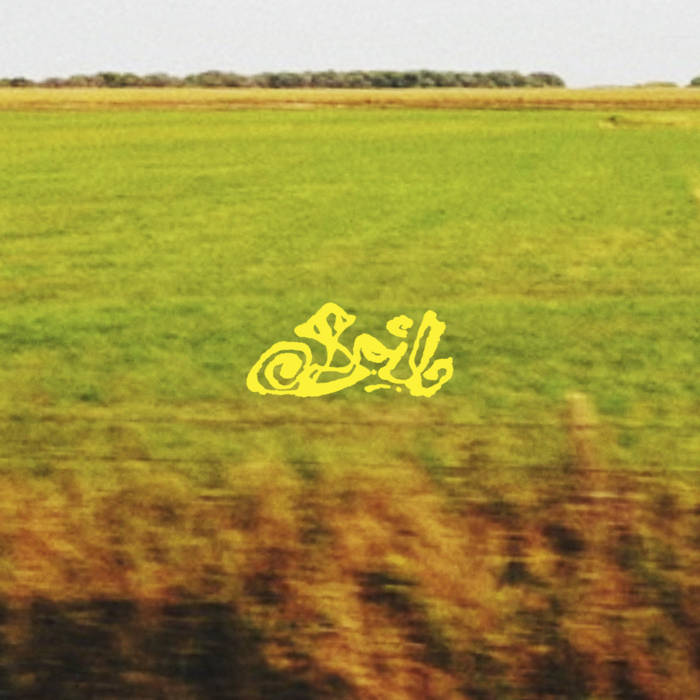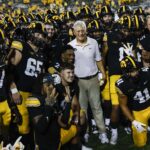The media room is suffocating, thick with stale air and carpet dust. Reporters sit scattered on the floor like loose change in a car cupholder. A veteran in all black, with wispy gray brows and wrinkled hands, cracks a joke.
“I liked it better when they had us in the weight room,” he laughs. “This closet is tough.”
The silence that follows is loud, broken only by popping gum and buzzing phones. Time drags by. They’re all waiting. Finally, Iowa’s head football coach, Kirk Ferentz, steps into this cage. He sways his right foot, glancing between his notes and the impatient faces as he attempts to explain the loss. His fingers twist and tighten the green cap of a half-drained Dasani.
He feels stuck, just like everyone in this room. Nobody likes being in a box. Yet that’s exactly how his team played.

Never-ending tents of cardinal red and gold line the perimeter of Jack Trice Stadium. Towering stages and rows of booming speakers cemented themselves on the grass for Big Noon Kickoff. On the outskirts, massive white bed sheets, smattered with smudged marker drawings, wave from rows of deteriorating college houses in the gentle morning breeze. It isn’t normally this crazy. But on a day like today, in the city of Ames, Iowa, it is. For the CyHawk matchup, there are a few certains: Beer is water, heckling is encouraged, and hate week is to be taken seriously. This is a battle for the state of Iowa.
Since 2011, the Hawkeyes had been unbeaten in this stadium against the Cyclones of Iowa State. Six straight victories away from home. But today, they lost. 16-13. The run was over. In a realm where Cyclone head coach Matt Campbell has made constant changes, Iowa has not. History doesn’t matter, because rivalries don’t always play out on paper. They play out inside the box Iowa insists on living in.
In week one against UAlbany, Iowa quarterback Mark Gronowski completed just 8 passes for 44 yards. That is 5.5 yards a catch. This week in Ames, he went 13-for-83, only 6.4 yards a completion. Through two games, Iowa averages just over six yards every time the ball is caught. Take away Saturday’s two longest plays, 22 and 15 yards, and you’re left with 11 completions for 46 yards. Four yards a pop. That’s not just inefficiency. That’s confinement. The first down chains act like orange kryptonite for this team. Gronowski’s 127 passing yards through two games are the fewest by a Big Ten quarterback to open a season in history, breaking a record no one wanted.

Defenses have known it for years. They sit back in zone shells, safeties high and corners off, daring Iowa to throw over the top. Iowa fans are quick to blame the quarterback, but it’s not always under his control. There are no double moves and no layered routes to stretch coverage. Rather, a parade of curls and checkdowns. Linebackers squeeze the windows, corners close on the ball, and the whole thing looks almost easy to defend. Often, it is.
Once in a while, the box cracks. With 13:17 left in the third quarter of today’s game, Iowa ran one of its cleanest designs in years. Out of trips left, Jacob Gill pressed vertically from the slot before breaking wide on a deep out. Sam Phillips and Seth Anderson cleared the safeties with hard vertical stems, leaving Gill free in space. Gronowski hit him for 22 yards. Iowa’s longest play of the day. And the season. It’s a glimpse of what could be, if only the Hawkeyes dared to live outside the lines.
Most of the time, though, the offense retreats back into its four walls of comfort. And so do the questions.

The faded eggshell-colored foam soles from his Nike shoes are forming creases. The weight of an entire fanbase is pressing into him. Ferentz doesn’t flinch at questions. But he feels the walls closing. The same walls his offense refuses to leave. The ones that won’t help them win.
“Coach, you’ve lost the last 10 games to ranked opponents,” one reporter starts to ask. “Do you feel like you’re-“
“I wasn’t aware of that so thanks for reminding me,” Ferentz interjects. “We’re about three points short today. That’s all I can say.”
Three points short, and constantly yards shy. When the presser concludes, he pushes back from the table and lifts his eyebrows, a flash of frustration crossing his face. For a moment, he escapes the room, the reporters, the loss. Outside, the tents have folded, the streets are quiet, and Ames exhales. Fans leave, drunk on tradition. But the memory of the game lingers. And by next week, it will be here, waiting again, patient and unyielding.





